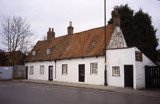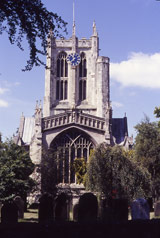A brief history of Cottingham
|
6th Century A.D. The village was founded by Anglo-Saxons, who called it Cottingaham 'the homestead of Cotta's people'. Surrounded by almost 10,000 acres of excellent arable land, pasture, woodland and marsh, it was built on the spring line of the Wolds, close to the meeting points of several streams. (Copyright Peter McClure, Cottingham Local History Society) |

White Cottages, Cottingham Village Green, picture taken 1997 (Courtesy of Peter McClure, Cottingham Local History Society) |
|
|
|
Elmtree House (1820s) now the Cottingham Memorial Club and British Legion HQ (Courtesy of Peter McClure, Cottingham Local History Society)
|
9th-11th CenturiesViking immigrants brought Danish words into East Riding English, including gate 'street', beck 'stream' and thwaite 'woodland clearing', words that occur in Cottingham's street names. (Copyright Peter McClure, Cottingham Local History Society) |
|
11th-15th Centuries. Following the Conquest, Cottingham's new Norman lords built a fortified manor house or castle at the west end of the village, rebuilt the church in stone and obtained licences to hold markets. After Beverley and Hull, Cottingham was the East Riding's third most populous and prosperous town. (Copyright Peter McClure, Cottingham Local History Society) |
Map of Castle Site, 1927 (Shown with kind permission of Ordnance Survey)
|
|
Blue Bell Inn, West Green (Courtesy of Peter McClure, Cottingham Local History Society)
|
16th-19th Centuries. After the Reformation, Protestantism took a strong hold in Cottingham, which broadly supported Parliament in the Civil War and later became home to Independents and Methodists. (Copyright Peter McClure, Cottingham Local History Society) |
|
18th-19th Centuries. Most of Cottingham's medieval common lands were enclosed and became private property. Large numbers of market gardens were started, using Hull's 'night soil' to fertilise the fields of vegetables, flowers and soft fruit, which were sold at Hull market. Many fine country houses and grounds were created around the village by wealthy businessmen from Hull. The coming of the railway to Cottingham in 1846 tied Cottingham closer to Hull. Extra housing was then built on the eastern side for a growing population of commuters, and towards the end of the century shops were springing up in Hallgate and King Street. (Copyright Peter McClure, Cottingham Local History Society) |
Westfield House in the 1890's (Courtesy of Peter McClure, Cottingham Local History Society)
|

Police Station, Finkle Street about 1910 (Courtesy of Peter McClure, Cottingham Local History Society) |
20th Century. Cottingham lost c.4,000 acres of land to the expanding city of Hull, while Cottingham's own population grew from under 4,000 in 1900 to over 17,000 in 2000. Numerous housing estates were built, partly on former farming and market gardening land and partly in the grounds of the large 'gentry' houses, many of which were demolished in the 1930s and 1960s. Since the 1960s, Cottingham has been home to thousands of students and staff of Hull University, which acquired and preserved some of the large houses and also built a fine complex of student halls in Northgate ('The Lawns'). (Copyright Peter McClure, Cottingham Local History Society) |
Cottingham Local History Society
|
The Society was founded in 1952, and offers to its members a Journal and a programme of evening talks about local history on the first Wednesday of the month from October to April.Publications by the Society currently on sale include an illustrated history, Cottingham in the 20th Century (2005) and various booklets and postcards. The Society is compiling photographic and oral archives as part of its Historic Cottingham Project, and welcomes new material and volunteer researchers. For membership details and information about other Society activities contact Peter McClure, Chairman, 47 West End Road, Cottingham, HU16 5PW, tel. 01482-848014, or see our entry under the "Community Groups" section of this website (Societies) or look out for our meeting advertisements in Cottingham Library. |

St Mary the Virgin, present building dates from the 1300s (Courtesy of Peter McClure, Cottingham Local History Society)
|